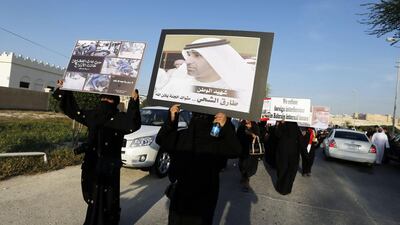ABU DHABI // Bahrain vowed on Tuesday to continue combating terrorism after a bomb killed three policemen including Emirati officer First Lieutenant Tareq Al Shehi.
In an extraordinary meeting, the Bahraini cabinet added three groups to the official list of terrorist organisations. They included the Al Ashtar Brigade which claimed responsibility for the attack on Monday. The Popular Resistance Brigade and another opposition faction, the Coalition Youth of February 14 were also added to the list.
The cabinet also tasked the foreign minister with seeking the groups’ inclusion on international terrorist lists.
In response to the worst attack on security forces since a Shiite-led uprising was suppressed in 2011, 25 people were arrested as the interior ministry said it would “continue to fight terrorism relentlessly.”
Bahrain’s interior minister, Lieutenant-General Shaikh Rashid bin Abdulla Al Khalifa, vowed to catch those responsible and accused Iran of training militants from Bahrain.
“As we have said before, what happens inside our country has foreign links,” he said.
Lt Al Shehi, 41, from Ras Al Khaimah, was the first officer from Gulf forces to die in Bahrain.
Condemning the “heinous act,” Crown Prince Salman bin Hamad Al Khalifa praised the support his country had received from Bahrain’s “GCC brethren”.
The condemnation of the attack came as Bahrain yesterday marked a day of mourning and many called for increased security.
Parliament ended its session early in solidarity with the victims, and some members urged the government to use new antiterrorism rules — implemented last summer — on those behind the attacks.
MP Sawsan Al Taqawi said Bahrain’s government should use the laws to go after the leaders who are pushing young people to riot and “vandalise”.
After closing their session, MPs visited the UAE embassy to offer condolences and meet the ambassador, Mohammed Sultan Saif Al Suwaidi, Ms Taqawi said.
Speaking of Lt Al Shehi, Ms Taqawi said Bahrainis considered him one of their own. “We are calling him one of our children or brothers who was killed in this terrorist attack.”
Bahrain has been rocked by low-level protests since 2011, when the Shiite-led opposition led gatherings to call for an end to what they argued was their economic and political marginalisation. Joint Gulf forces known as the Peninsula Shield entered Bahrain at the King’s request in 2011 to disperse the protests.
Lt Al Shehi was in Bahrain as part of the Gulf Waves force, cooperation included in a Gulf security agreement signed in 2012, Bahraini police said.
Near-daily rallies continue on the island. While many are peaceful, radical fringes of the opposition have increasingly turned to violent tactics such as improvised explosions and attacks on police stations.
Monday’s blast took place outside the village of Daih, when clashes broke out between mourners attending a funeral and police. The bomb was remotely detonated, the interior ministry said, indicating a degree of sophistication not yet witnessed in a string of small bombings that began in the spring of 2013.
Little is known about the Al Ashtar Brigades, which claimed responsibility for the bombing and in a second statement on a Facebook page yesterday called for further unrest.
Speaking to Bahrain TV, the Interior Minister suggested that such radical groups receive outside assistance, possibly from Iran.
In late December, Bahraini authorities said they had seized a boat from Iran carrying explosives, grenades, and fuses.
A coalition of six official opposition groups denied any link to the violence and condemned the blast as a terrorist and criminal act. But the opposition has faced criticism for not explicitly denouncing February 14 and other radical factions.
In a mark of the rising tension on the island, the Shiite opposition political society Al Wefaq said its headquarters was vandalised after the explosion.
The government’s listing of terrorist groups will now put “a lot of added pressure on the societies like Wefaq to distance themselves not only from violence but from violent groups”, said a political analyst close to government sources.
The attack also appears to have derailed attempts to reinvigorate Bahrain’s National Dialogue, a forum aimed at ending a three-year political crisis on the island.
Last month, both the opposition and groups aligned with the government had submitted proposals to the country’s Royal Court Minister to set an agenda for talks.
But after Monday’s attack, a coalition of 10 government-aligned political groups pulled out of the negotiations.
Analysts said that the increasing frequency of such attacks could also signal a growing conflict within the opposition. While groups such as Al Wefaq insisted on remaining non-violent, the street-level protesters often behave otherwise.
“It’s very clear that they don’t have control over a large part of [the street, including] those who are engaged in activities like we saw yesterday,” said Justin Gengler, a senior researcher at the Social and Economic Survey Research Institute at Qatar University.
foreign.desk@thenational.ae

